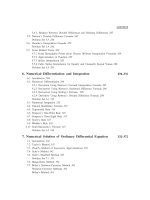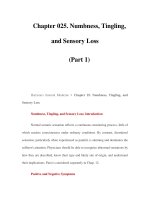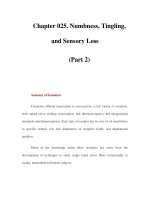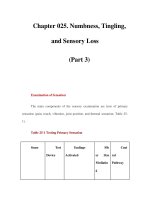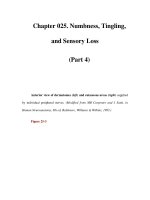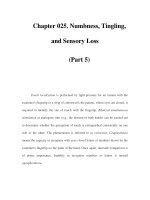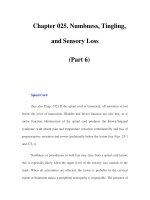Chapter 025. Numbness, Tingling, and Sensory Loss (Part 2) pps
Bạn đang xem bản rút gọn của tài liệu. Xem và tải ngay bản đầy đủ của tài liệu tại đây (61.36 KB, 5 trang )
Chapter 025. Numbness, Tingling,
and Sensory Loss
(Part 2)
Anatomy of Sensation
Cutaneous afferent innervation is conveyed by a rich variety of receptors,
both naked nerve endings (nociceptors and thermoreceptors) and encapsulated
terminals (mechanoreceptors). Each type of receptor has its own set of sensitivities
to specific stimuli, size and distinctness of receptive fields, and adaptational
qualities.
Much of the knowledge about these receptors has come from the
development of techniques to study single intact nerve fibers intraneurally in
awake, unanesthetized human subjects.
It is possible not only to record from but also to stimulate single fibers in
isolation. A single impulse, whether elicited by a natural stimulus or evoked by
electrical microstimulation in a large myelinated afferent fiber may be both
perceived and localized.
Afferent fibers of all sizes in peripheral nerve trunks traverse the dorsal
roots and enter the dorsal horn of the spinal cord (Fig. 25-1). From there the
smaller fibers take a different route to the parietal cortex than the larger fibers.
The polysynaptic projections of the smaller fibers (unmyelinated and small
myelinated), which subserve mainly nociception, temperature sensibility, and
touch, cross and ascend in the opposite anterior and lateral columns of the spinal
cord, through the brainstem, to the ventral posterolateral (VPL) nucleus of the
thalamus, and ultimately project to the postcentral gyrus of the parietal cortex
(Chap. 12).
This is the spinothalamic pathway or anterolateral system. The larger
fibers, which subserve tactile and position sense and kinesthesia, project rostrally
in the posterior column on the same side of the spinal cord and make their first
synapse in the gracile or cuneate nucleus of the lower medulla.
Axons of the second-order neuron decussate and ascend in the medial
lemniscus located medially in the medulla and in the tegmentum of the pons and
midbrain and synapse in the VPL nucleus; the third-order neurons project to
parietal cortex.
This large-fiber system is referred to as the posterior column–medial
lemniscal pathway (lemniscal, for short). Note that although the lemniscal and the
anterolateral pathways both project up the spinal cord to the thalamus, it is the
(crossed) anterolateral pathway that is referred to as the spinothalamic tract, by
convention.
Figure 25-1
The main somatosensory pathways.
The spinothalamic tract (pain, thermal sense) and the posterior column–
lemniscal system (touch, pressure, joint position) are shown. Offshoots from the
ascending anterolateral fasciculus (spinothalamic tract) to nuclei in the medulla,
pons, and mesencephalon and nuclear terminations of the tract are indicated.
(From AH Ropper, RH Brown, in Adams and Victor's Principles of Neurology, 8th
ed. New York, McGraw-Hill, 2007.)Although the fiber types and functions that
make up the spinothalamic and lemniscal systems are relatively well known, many
other fibers, particularly those associated with touch, pressure, and position sense,
ascend in a diffusely distributed pattern both ipsilaterally and contralaterally in the
anterolateral quadrants of the spinal cord. This explains why a complete lesion of
the posterior columns of the spinal cord may be associated with little sensory
deficit on examination.

